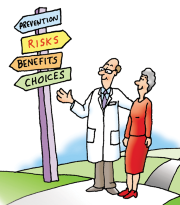Everyday during my research, I see news articles that conflict with one another about whether we can prevent Alzheimer’s disease. Today was no different when I saw a new headline touting the benefits of exercise and mental stimulation to stave off Alzheimer’s.
It wasn’t but a couple of minutes later that I saw a newly published article with a conflicting message saying a recent study shows that exercise doesn’t help stave off Alzheimer’s. Both articles were on what I believe are nationally syndicated sites.
 There are so many conflicting messages, as we try to simplify a disease that is extremely complicated and not understood.
There are so many conflicting messages, as we try to simplify a disease that is extremely complicated and not understood.
Can We Delay Alzheimer’s Disease?
Both articles used the word stave which in this usage means “to delay.” How can we, with any degree of accuracy, measure whether something is going to stave off a disease such as Alzheimer’s?
I now put this word into the same category I have for the word “may.” This category is reserved for things we just don’t know or understand so we have to put disclaimers: This may prevent Alzheimer’s; this may stave off the disease.
Its one step away from hype, but it can provide hope. Hope that if we make certain life-style decisions we can reduce our risk for getting Alzheimer’s.
If you’ve read my previous writings on the topic of prevention, you know I say “we have to do what makes sense.”
We may not know for sure what causes the disease or if we can prevent it, but we do know there are things we can do that make sense in reducing our risk.
I’m proud to announce that I have been asked to be a guest writer for SixtyandMe.com, where you can continue reading my thoughts on this subject in my article: How to Take Care of Your Brain as You Age.
Questions or thoughts? Let me know by commenting below:
If you like what you’ve read, why not receive periodic updates when you:
Subscribe to the TinT Newsletter





Thanks for this no-nonsense approach to a devastating diagnosis and disease. As a 24/7 Alzheimer’s caregiver to my sweet MIL, I don’t have a lot of time to read everything and you’re so right, there’s so much conflicting information. I often just go with my gut. Fortunately, she’s able to afford a nurse case manager so I’m not totally alone. I’m luckier than so many others who are totally alone and unpaid. Still, I love your streamline approach. Thank you!
You’re welcome Becke. I think using our gut and some common sense combined with love goes a long way. We have so much to still learn, and I don’t know if there will ever be an easy answer 🙂
Hello Mike,
I have read the recent articles in the newspapers and frankly find it hard to believe that staying physically active and solving mentally stimulating activities can hold back or even prevent Alzheimer’s. The majority of my patients are fit, non smoking, non drinking individuals. The families inform me that up to the point when they come into hospital they have walked miles everyday, socialise, they maintain their garden and still lead a very active life. Some have never had a days illness in their life. How can we believe this latest information?
I understand where you are coming from Jo. I remember when reports came out that being bilingual would slow or even prevent Alzheimer’s. I looked around the adult center where I volunteer, and about 7 out of the 25 people were bilingual. Several others appeared fit, and there was a doctor and professor in the group. However, each one had some form of dementia. Maybe they were smokers, or maybe they had concussions during wartime. Maybe they just drew the short straw. I don’t know. While we can’t throw our full faith into these reports, we can and must maintain hope that we can affect things through lifestyle choices. Hope keeps us going.